Evaluating the Smart State Plan: Privacy, Security and Ethical Issues
VerifiedAdded on 2023/06/09
|16
|4533
|286
Report
AI Summary
This report reflects on the personal approach and feelings on information security and privacy, specifically in the context of an Australian State Government implementing a 'Smart State Plan' inspired by Singapore's 'Smart Nation Plan'. The plan involves a network of smart sensors and cameras to monitor citizen behavior and address street crime. The report discusses the personal and ethical implications of such a network, including the types of people affected, expected behavior changes, and associated risks like privacy violations and cybercrime. It also evaluates the implications of Wi-Fi hotspots and digital identity on privacy, providing steps to protect digital identity while operating mobile devices. The analysis covers concerns about government surveillance, data breaches, and the ethical responsibilities of implementing such technologies.

Computer Privacy and Security
Privacy and Security Reflection
Privacy and Security Reflection
Paraphrase This Document
Need a fresh take? Get an instant paraphrase of this document with our AI Paraphraser
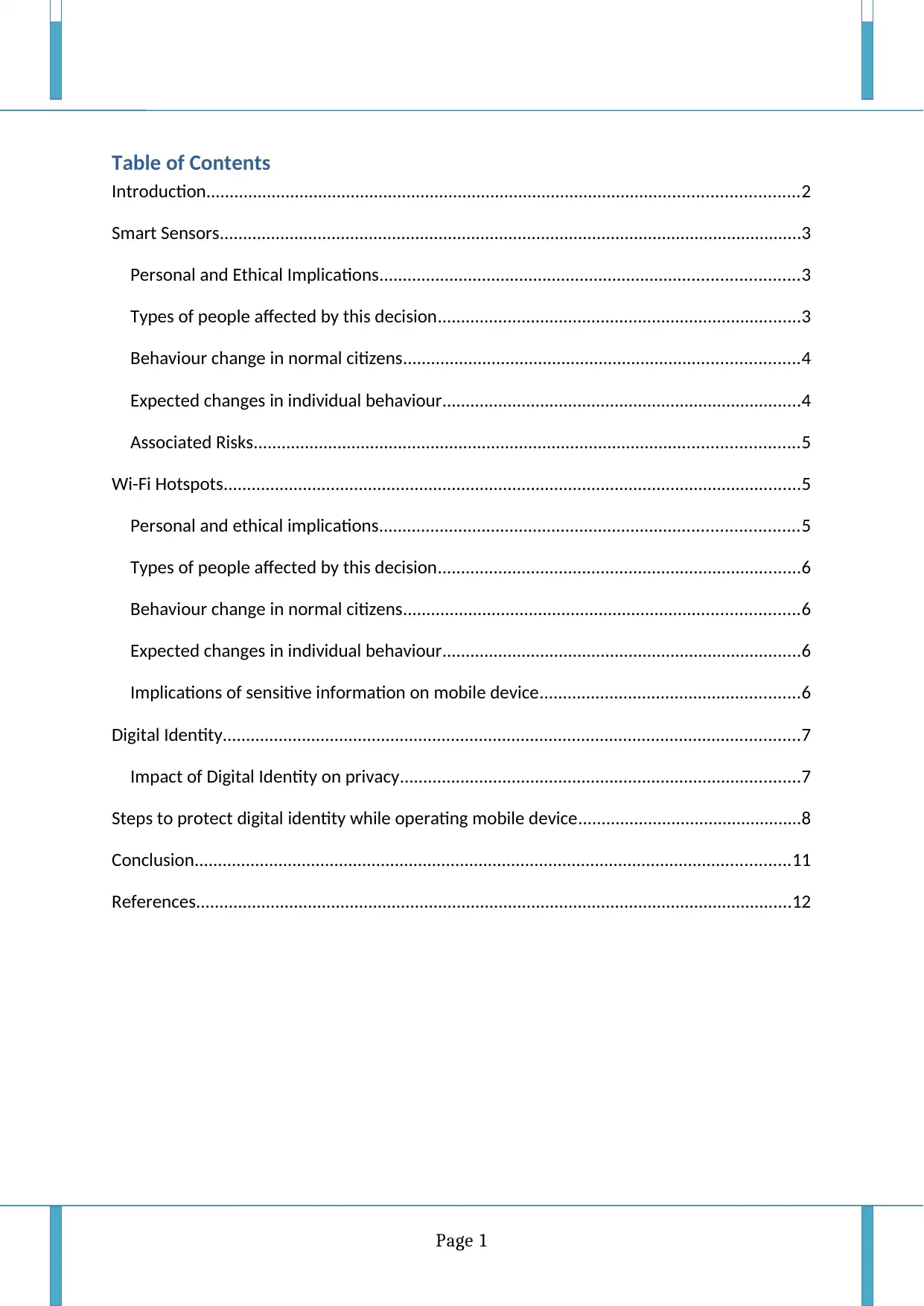
Table of Contents
Introduction...............................................................................................................................2
Smart Sensors.............................................................................................................................3
Personal and Ethical Implications..........................................................................................3
Types of people affected by this decision..............................................................................3
Behaviour change in normal citizens.....................................................................................4
Expected changes in individual behaviour.............................................................................4
Associated Risks.....................................................................................................................5
Wi-Fi Hotspots............................................................................................................................5
Personal and ethical implications..........................................................................................5
Types of people affected by this decision..............................................................................6
Behaviour change in normal citizens.....................................................................................6
Expected changes in individual behaviour.............................................................................6
Implications of sensitive information on mobile device........................................................6
Digital Identity............................................................................................................................7
Impact of Digital Identity on privacy......................................................................................7
Steps to protect digital identity while operating mobile device................................................8
Conclusion................................................................................................................................11
References................................................................................................................................12
Page 1
Introduction...............................................................................................................................2
Smart Sensors.............................................................................................................................3
Personal and Ethical Implications..........................................................................................3
Types of people affected by this decision..............................................................................3
Behaviour change in normal citizens.....................................................................................4
Expected changes in individual behaviour.............................................................................4
Associated Risks.....................................................................................................................5
Wi-Fi Hotspots............................................................................................................................5
Personal and ethical implications..........................................................................................5
Types of people affected by this decision..............................................................................6
Behaviour change in normal citizens.....................................................................................6
Expected changes in individual behaviour.............................................................................6
Implications of sensitive information on mobile device........................................................6
Digital Identity............................................................................................................................7
Impact of Digital Identity on privacy......................................................................................7
Steps to protect digital identity while operating mobile device................................................8
Conclusion................................................................................................................................11
References................................................................................................................................12
Page 1
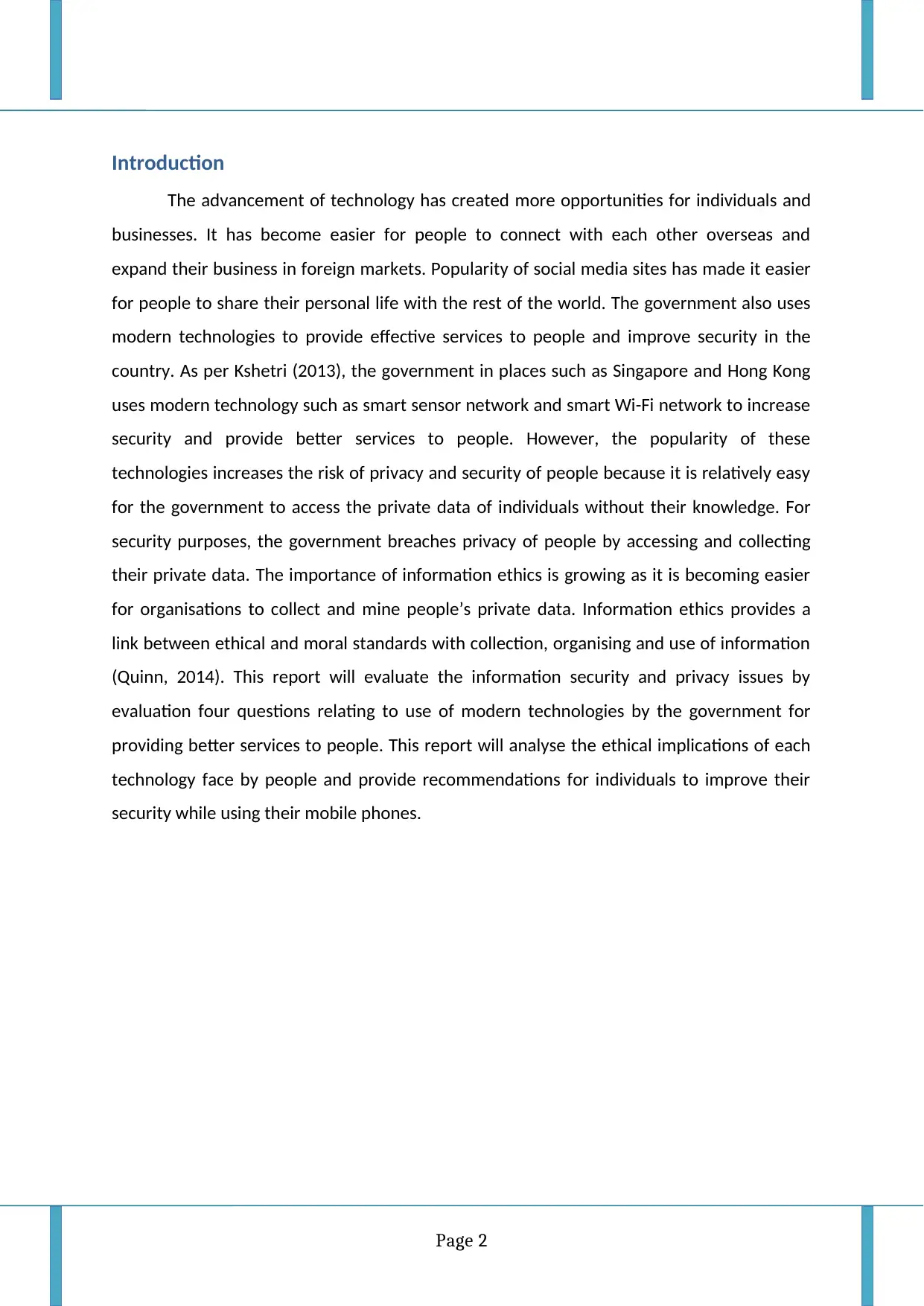
Introduction
The advancement of technology has created more opportunities for individuals and
businesses. It has become easier for people to connect with each other overseas and
expand their business in foreign markets. Popularity of social media sites has made it easier
for people to share their personal life with the rest of the world. The government also uses
modern technologies to provide effective services to people and improve security in the
country. As per Kshetri (2013), the government in places such as Singapore and Hong Kong
uses modern technology such as smart sensor network and smart Wi-Fi network to increase
security and provide better services to people. However, the popularity of these
technologies increases the risk of privacy and security of people because it is relatively easy
for the government to access the private data of individuals without their knowledge. For
security purposes, the government breaches privacy of people by accessing and collecting
their private data. The importance of information ethics is growing as it is becoming easier
for organisations to collect and mine people’s private data. Information ethics provides a
link between ethical and moral standards with collection, organising and use of information
(Quinn, 2014). This report will evaluate the information security and privacy issues by
evaluation four questions relating to use of modern technologies by the government for
providing better services to people. This report will analyse the ethical implications of each
technology face by people and provide recommendations for individuals to improve their
security while using their mobile phones.
Page 2
The advancement of technology has created more opportunities for individuals and
businesses. It has become easier for people to connect with each other overseas and
expand their business in foreign markets. Popularity of social media sites has made it easier
for people to share their personal life with the rest of the world. The government also uses
modern technologies to provide effective services to people and improve security in the
country. As per Kshetri (2013), the government in places such as Singapore and Hong Kong
uses modern technology such as smart sensor network and smart Wi-Fi network to increase
security and provide better services to people. However, the popularity of these
technologies increases the risk of privacy and security of people because it is relatively easy
for the government to access the private data of individuals without their knowledge. For
security purposes, the government breaches privacy of people by accessing and collecting
their private data. The importance of information ethics is growing as it is becoming easier
for organisations to collect and mine people’s private data. Information ethics provides a
link between ethical and moral standards with collection, organising and use of information
(Quinn, 2014). This report will evaluate the information security and privacy issues by
evaluation four questions relating to use of modern technologies by the government for
providing better services to people. This report will analyse the ethical implications of each
technology face by people and provide recommendations for individuals to improve their
security while using their mobile phones.
Page 2
⊘ This is a preview!⊘
Do you want full access?
Subscribe today to unlock all pages.

Trusted by 1+ million students worldwide
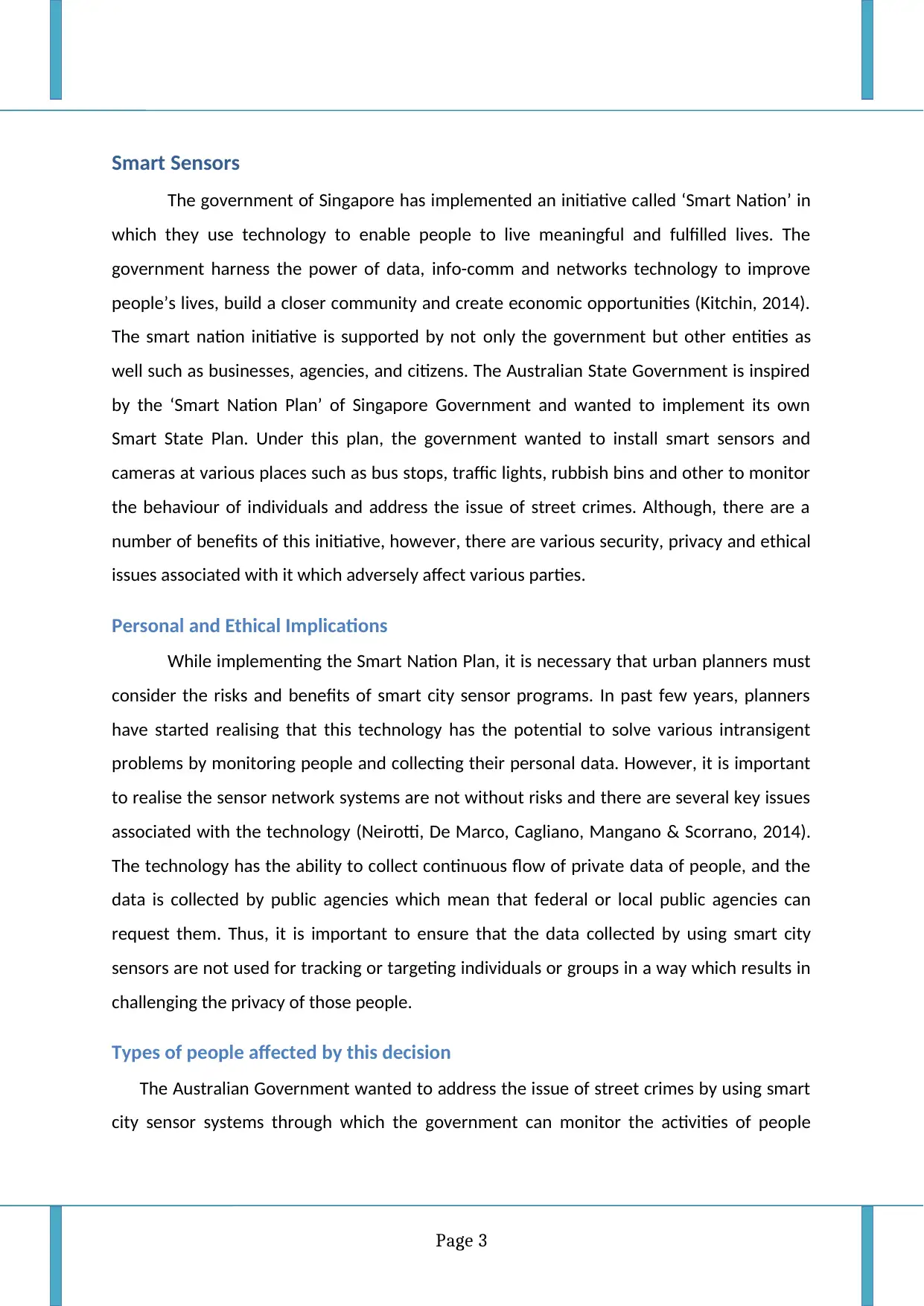
Smart Sensors
The government of Singapore has implemented an initiative called ‘Smart Nation’ in
which they use technology to enable people to live meaningful and fulfilled lives. The
government harness the power of data, info-comm and networks technology to improve
people’s lives, build a closer community and create economic opportunities (Kitchin, 2014).
The smart nation initiative is supported by not only the government but other entities as
well such as businesses, agencies, and citizens. The Australian State Government is inspired
by the ‘Smart Nation Plan’ of Singapore Government and wanted to implement its own
Smart State Plan. Under this plan, the government wanted to install smart sensors and
cameras at various places such as bus stops, traffic lights, rubbish bins and other to monitor
the behaviour of individuals and address the issue of street crimes. Although, there are a
number of benefits of this initiative, however, there are various security, privacy and ethical
issues associated with it which adversely affect various parties.
Personal and Ethical Implications
While implementing the Smart Nation Plan, it is necessary that urban planners must
consider the risks and benefits of smart city sensor programs. In past few years, planners
have started realising that this technology has the potential to solve various intransigent
problems by monitoring people and collecting their personal data. However, it is important
to realise the sensor network systems are not without risks and there are several key issues
associated with the technology (Neirotti, De Marco, Cagliano, Mangano & Scorrano, 2014).
The technology has the ability to collect continuous flow of private data of people, and the
data is collected by public agencies which mean that federal or local public agencies can
request them. Thus, it is important to ensure that the data collected by using smart city
sensors are not used for tracking or targeting individuals or groups in a way which results in
challenging the privacy of those people.
Types of people affected by this decision
The Australian Government wanted to address the issue of street crimes by using smart
city sensor systems through which the government can monitor the activities of people
Page 3
The government of Singapore has implemented an initiative called ‘Smart Nation’ in
which they use technology to enable people to live meaningful and fulfilled lives. The
government harness the power of data, info-comm and networks technology to improve
people’s lives, build a closer community and create economic opportunities (Kitchin, 2014).
The smart nation initiative is supported by not only the government but other entities as
well such as businesses, agencies, and citizens. The Australian State Government is inspired
by the ‘Smart Nation Plan’ of Singapore Government and wanted to implement its own
Smart State Plan. Under this plan, the government wanted to install smart sensors and
cameras at various places such as bus stops, traffic lights, rubbish bins and other to monitor
the behaviour of individuals and address the issue of street crimes. Although, there are a
number of benefits of this initiative, however, there are various security, privacy and ethical
issues associated with it which adversely affect various parties.
Personal and Ethical Implications
While implementing the Smart Nation Plan, it is necessary that urban planners must
consider the risks and benefits of smart city sensor programs. In past few years, planners
have started realising that this technology has the potential to solve various intransigent
problems by monitoring people and collecting their personal data. However, it is important
to realise the sensor network systems are not without risks and there are several key issues
associated with the technology (Neirotti, De Marco, Cagliano, Mangano & Scorrano, 2014).
The technology has the ability to collect continuous flow of private data of people, and the
data is collected by public agencies which mean that federal or local public agencies can
request them. Thus, it is important to ensure that the data collected by using smart city
sensors are not used for tracking or targeting individuals or groups in a way which results in
challenging the privacy of those people.
Types of people affected by this decision
The Australian Government wanted to address the issue of street crimes by using smart
city sensor systems through which the government can monitor the activities of people
Page 3
Paraphrase This Document
Need a fresh take? Get an instant paraphrase of this document with our AI Paraphraser
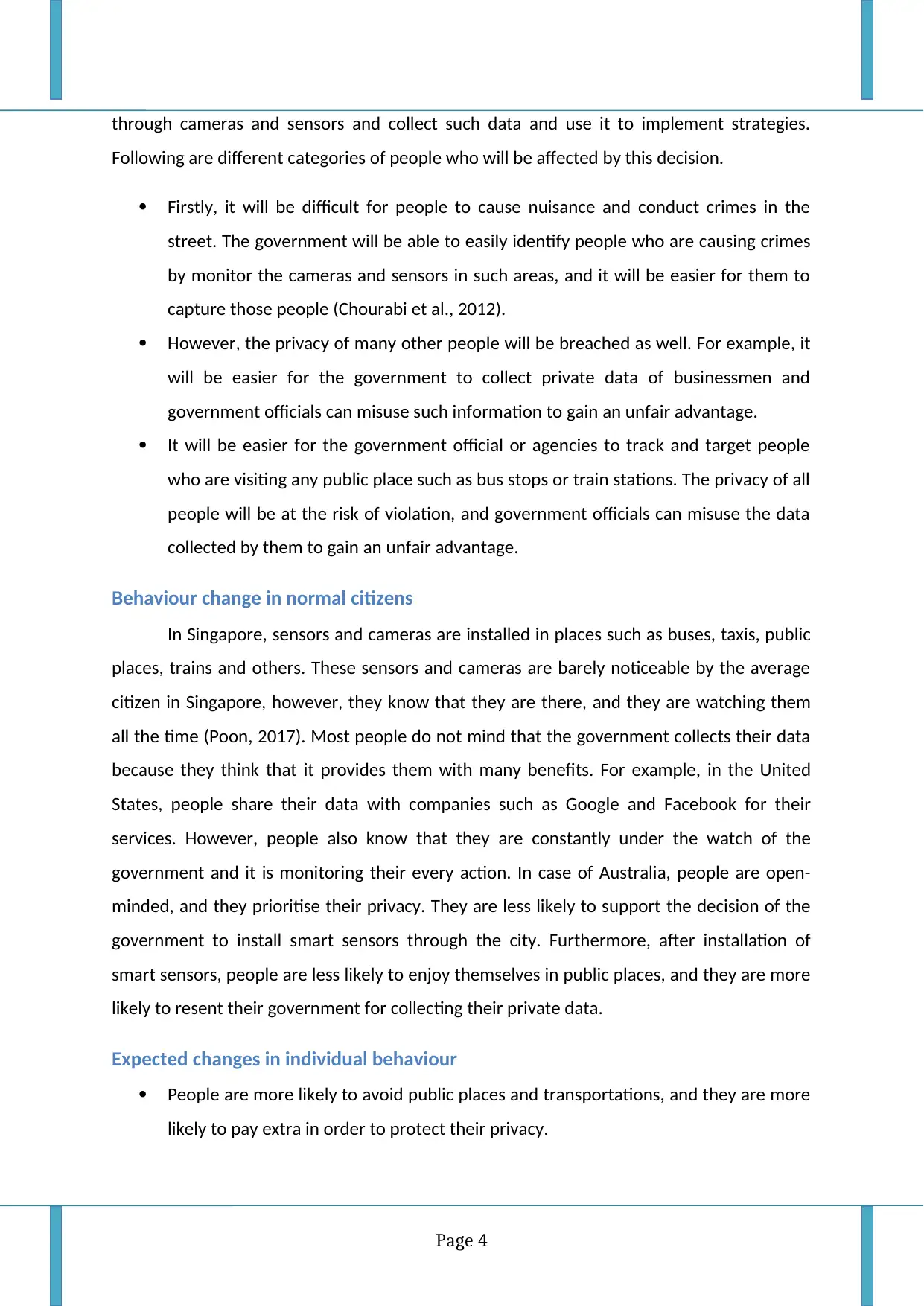
through cameras and sensors and collect such data and use it to implement strategies.
Following are different categories of people who will be affected by this decision.
Firstly, it will be difficult for people to cause nuisance and conduct crimes in the
street. The government will be able to easily identify people who are causing crimes
by monitor the cameras and sensors in such areas, and it will be easier for them to
capture those people (Chourabi et al., 2012).
However, the privacy of many other people will be breached as well. For example, it
will be easier for the government to collect private data of businessmen and
government officials can misuse such information to gain an unfair advantage.
It will be easier for the government official or agencies to track and target people
who are visiting any public place such as bus stops or train stations. The privacy of all
people will be at the risk of violation, and government officials can misuse the data
collected by them to gain an unfair advantage.
Behaviour change in normal citizens
In Singapore, sensors and cameras are installed in places such as buses, taxis, public
places, trains and others. These sensors and cameras are barely noticeable by the average
citizen in Singapore, however, they know that they are there, and they are watching them
all the time (Poon, 2017). Most people do not mind that the government collects their data
because they think that it provides them with many benefits. For example, in the United
States, people share their data with companies such as Google and Facebook for their
services. However, people also know that they are constantly under the watch of the
government and it is monitoring their every action. In case of Australia, people are open-
minded, and they prioritise their privacy. They are less likely to support the decision of the
government to install smart sensors through the city. Furthermore, after installation of
smart sensors, people are less likely to enjoy themselves in public places, and they are more
likely to resent their government for collecting their private data.
Expected changes in individual behaviour
People are more likely to avoid public places and transportations, and they are more
likely to pay extra in order to protect their privacy.
Page 4
Following are different categories of people who will be affected by this decision.
Firstly, it will be difficult for people to cause nuisance and conduct crimes in the
street. The government will be able to easily identify people who are causing crimes
by monitor the cameras and sensors in such areas, and it will be easier for them to
capture those people (Chourabi et al., 2012).
However, the privacy of many other people will be breached as well. For example, it
will be easier for the government to collect private data of businessmen and
government officials can misuse such information to gain an unfair advantage.
It will be easier for the government official or agencies to track and target people
who are visiting any public place such as bus stops or train stations. The privacy of all
people will be at the risk of violation, and government officials can misuse the data
collected by them to gain an unfair advantage.
Behaviour change in normal citizens
In Singapore, sensors and cameras are installed in places such as buses, taxis, public
places, trains and others. These sensors and cameras are barely noticeable by the average
citizen in Singapore, however, they know that they are there, and they are watching them
all the time (Poon, 2017). Most people do not mind that the government collects their data
because they think that it provides them with many benefits. For example, in the United
States, people share their data with companies such as Google and Facebook for their
services. However, people also know that they are constantly under the watch of the
government and it is monitoring their every action. In case of Australia, people are open-
minded, and they prioritise their privacy. They are less likely to support the decision of the
government to install smart sensors through the city. Furthermore, after installation of
smart sensors, people are less likely to enjoy themselves in public places, and they are more
likely to resent their government for collecting their private data.
Expected changes in individual behaviour
People are more likely to avoid public places and transportations, and they are more
likely to pay extra in order to protect their privacy.
Page 4
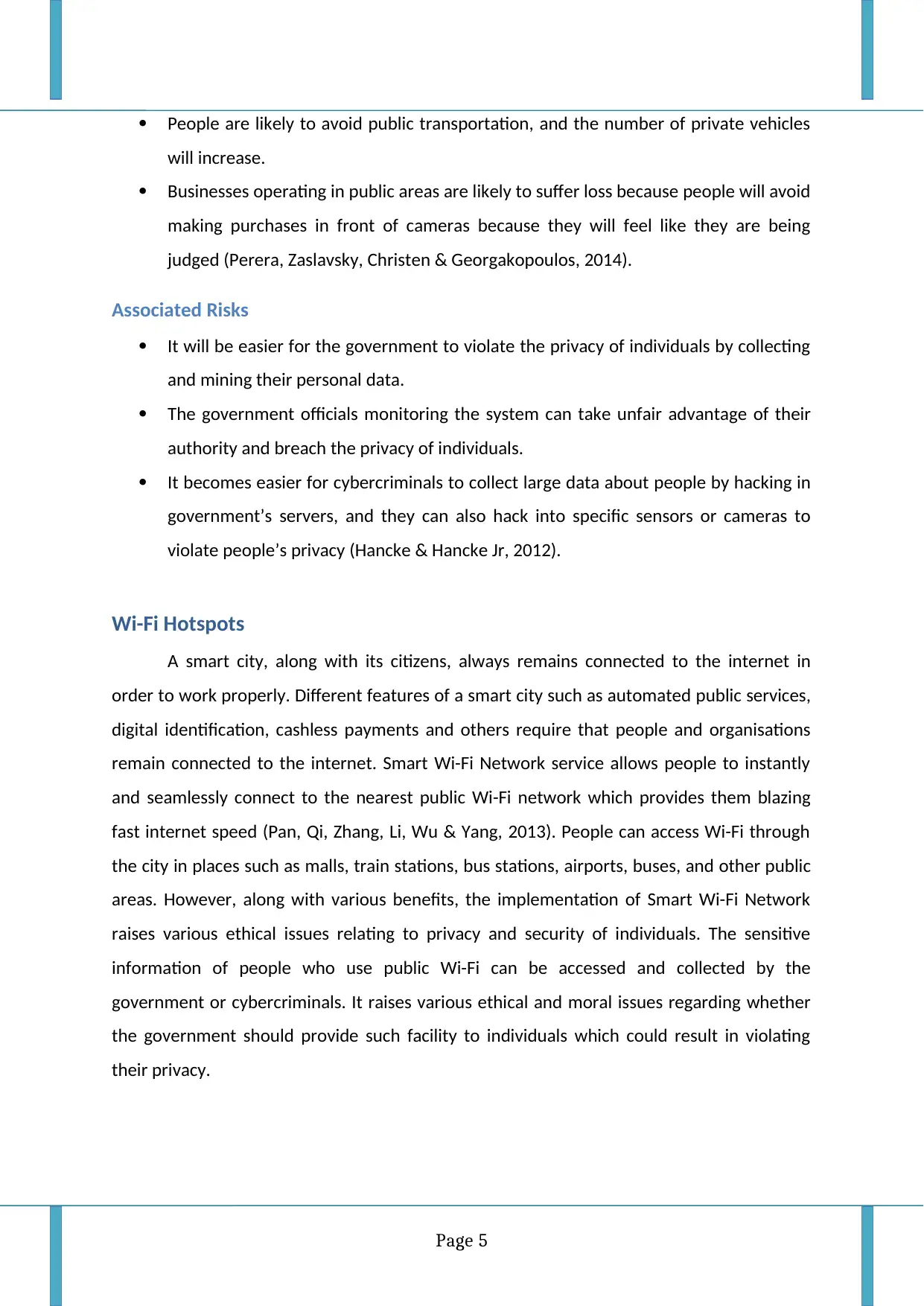
People are likely to avoid public transportation, and the number of private vehicles
will increase.
Businesses operating in public areas are likely to suffer loss because people will avoid
making purchases in front of cameras because they will feel like they are being
judged (Perera, Zaslavsky, Christen & Georgakopoulos, 2014).
Associated Risks
It will be easier for the government to violate the privacy of individuals by collecting
and mining their personal data.
The government officials monitoring the system can take unfair advantage of their
authority and breach the privacy of individuals.
It becomes easier for cybercriminals to collect large data about people by hacking in
government’s servers, and they can also hack into specific sensors or cameras to
violate people’s privacy (Hancke & Hancke Jr, 2012).
Wi-Fi Hotspots
A smart city, along with its citizens, always remains connected to the internet in
order to work properly. Different features of a smart city such as automated public services,
digital identification, cashless payments and others require that people and organisations
remain connected to the internet. Smart Wi-Fi Network service allows people to instantly
and seamlessly connect to the nearest public Wi-Fi network which provides them blazing
fast internet speed (Pan, Qi, Zhang, Li, Wu & Yang, 2013). People can access Wi-Fi through
the city in places such as malls, train stations, bus stations, airports, buses, and other public
areas. However, along with various benefits, the implementation of Smart Wi-Fi Network
raises various ethical issues relating to privacy and security of individuals. The sensitive
information of people who use public Wi-Fi can be accessed and collected by the
government or cybercriminals. It raises various ethical and moral issues regarding whether
the government should provide such facility to individuals which could result in violating
their privacy.
Page 5
will increase.
Businesses operating in public areas are likely to suffer loss because people will avoid
making purchases in front of cameras because they will feel like they are being
judged (Perera, Zaslavsky, Christen & Georgakopoulos, 2014).
Associated Risks
It will be easier for the government to violate the privacy of individuals by collecting
and mining their personal data.
The government officials monitoring the system can take unfair advantage of their
authority and breach the privacy of individuals.
It becomes easier for cybercriminals to collect large data about people by hacking in
government’s servers, and they can also hack into specific sensors or cameras to
violate people’s privacy (Hancke & Hancke Jr, 2012).
Wi-Fi Hotspots
A smart city, along with its citizens, always remains connected to the internet in
order to work properly. Different features of a smart city such as automated public services,
digital identification, cashless payments and others require that people and organisations
remain connected to the internet. Smart Wi-Fi Network service allows people to instantly
and seamlessly connect to the nearest public Wi-Fi network which provides them blazing
fast internet speed (Pan, Qi, Zhang, Li, Wu & Yang, 2013). People can access Wi-Fi through
the city in places such as malls, train stations, bus stations, airports, buses, and other public
areas. However, along with various benefits, the implementation of Smart Wi-Fi Network
raises various ethical issues relating to privacy and security of individuals. The sensitive
information of people who use public Wi-Fi can be accessed and collected by the
government or cybercriminals. It raises various ethical and moral issues regarding whether
the government should provide such facility to individuals which could result in violating
their privacy.
Page 5
⊘ This is a preview!⊘
Do you want full access?
Subscribe today to unlock all pages.

Trusted by 1+ million students worldwide
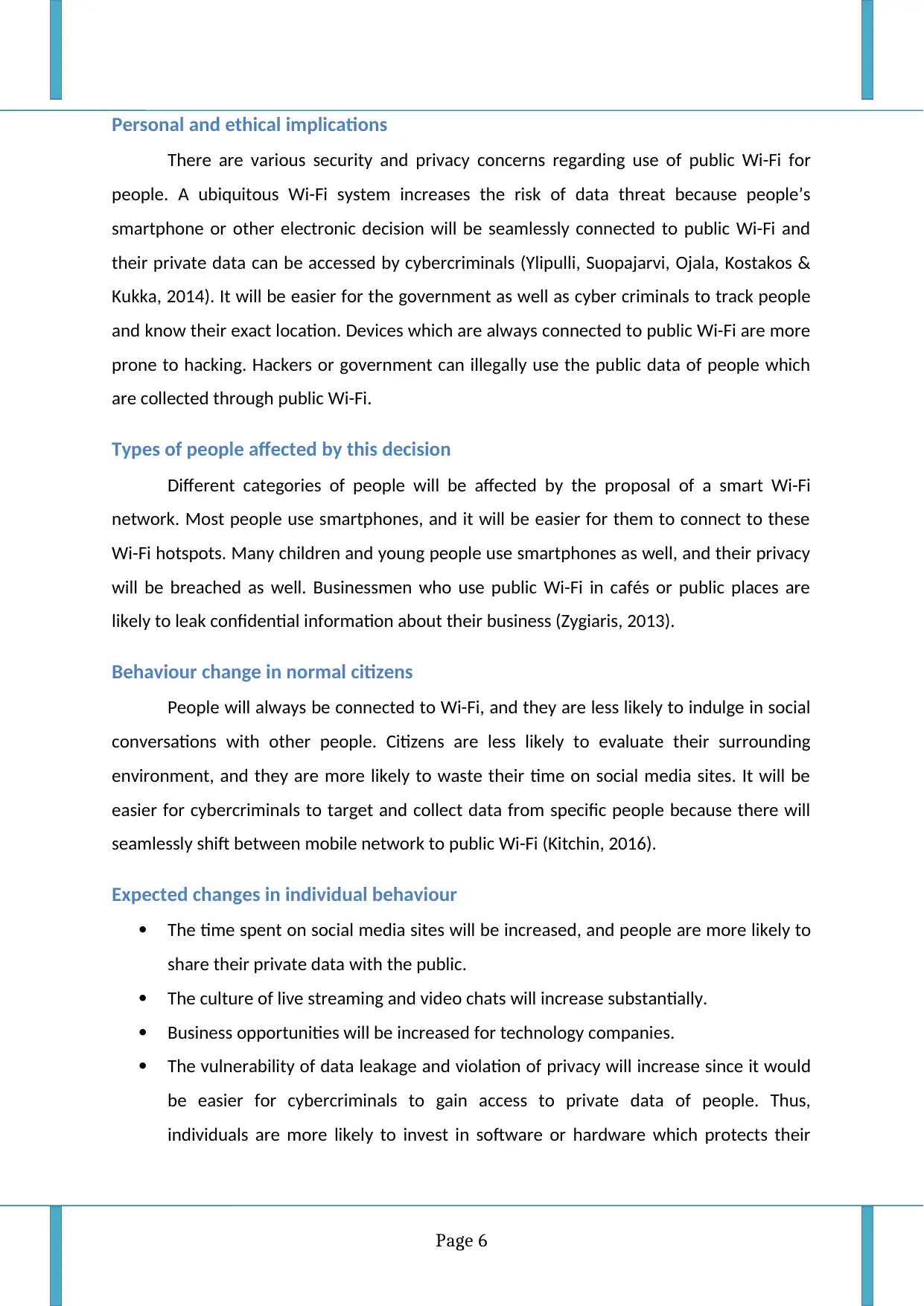
Personal and ethical implications
There are various security and privacy concerns regarding use of public Wi-Fi for
people. A ubiquitous Wi-Fi system increases the risk of data threat because people’s
smartphone or other electronic decision will be seamlessly connected to public Wi-Fi and
their private data can be accessed by cybercriminals (Ylipulli, Suopajarvi, Ojala, Kostakos &
Kukka, 2014). It will be easier for the government as well as cyber criminals to track people
and know their exact location. Devices which are always connected to public Wi-Fi are more
prone to hacking. Hackers or government can illegally use the public data of people which
are collected through public Wi-Fi.
Types of people affected by this decision
Different categories of people will be affected by the proposal of a smart Wi-Fi
network. Most people use smartphones, and it will be easier for them to connect to these
Wi-Fi hotspots. Many children and young people use smartphones as well, and their privacy
will be breached as well. Businessmen who use public Wi-Fi in cafés or public places are
likely to leak confidential information about their business (Zygiaris, 2013).
Behaviour change in normal citizens
People will always be connected to Wi-Fi, and they are less likely to indulge in social
conversations with other people. Citizens are less likely to evaluate their surrounding
environment, and they are more likely to waste their time on social media sites. It will be
easier for cybercriminals to target and collect data from specific people because there will
seamlessly shift between mobile network to public Wi-Fi (Kitchin, 2016).
Expected changes in individual behaviour
The time spent on social media sites will be increased, and people are more likely to
share their private data with the public.
The culture of live streaming and video chats will increase substantially.
Business opportunities will be increased for technology companies.
The vulnerability of data leakage and violation of privacy will increase since it would
be easier for cybercriminals to gain access to private data of people. Thus,
individuals are more likely to invest in software or hardware which protects their
Page 6
There are various security and privacy concerns regarding use of public Wi-Fi for
people. A ubiquitous Wi-Fi system increases the risk of data threat because people’s
smartphone or other electronic decision will be seamlessly connected to public Wi-Fi and
their private data can be accessed by cybercriminals (Ylipulli, Suopajarvi, Ojala, Kostakos &
Kukka, 2014). It will be easier for the government as well as cyber criminals to track people
and know their exact location. Devices which are always connected to public Wi-Fi are more
prone to hacking. Hackers or government can illegally use the public data of people which
are collected through public Wi-Fi.
Types of people affected by this decision
Different categories of people will be affected by the proposal of a smart Wi-Fi
network. Most people use smartphones, and it will be easier for them to connect to these
Wi-Fi hotspots. Many children and young people use smartphones as well, and their privacy
will be breached as well. Businessmen who use public Wi-Fi in cafés or public places are
likely to leak confidential information about their business (Zygiaris, 2013).
Behaviour change in normal citizens
People will always be connected to Wi-Fi, and they are less likely to indulge in social
conversations with other people. Citizens are less likely to evaluate their surrounding
environment, and they are more likely to waste their time on social media sites. It will be
easier for cybercriminals to target and collect data from specific people because there will
seamlessly shift between mobile network to public Wi-Fi (Kitchin, 2016).
Expected changes in individual behaviour
The time spent on social media sites will be increased, and people are more likely to
share their private data with the public.
The culture of live streaming and video chats will increase substantially.
Business opportunities will be increased for technology companies.
The vulnerability of data leakage and violation of privacy will increase since it would
be easier for cybercriminals to gain access to private data of people. Thus,
individuals are more likely to invest in software or hardware which protects their
Page 6
Paraphrase This Document
Need a fresh take? Get an instant paraphrase of this document with our AI Paraphraser
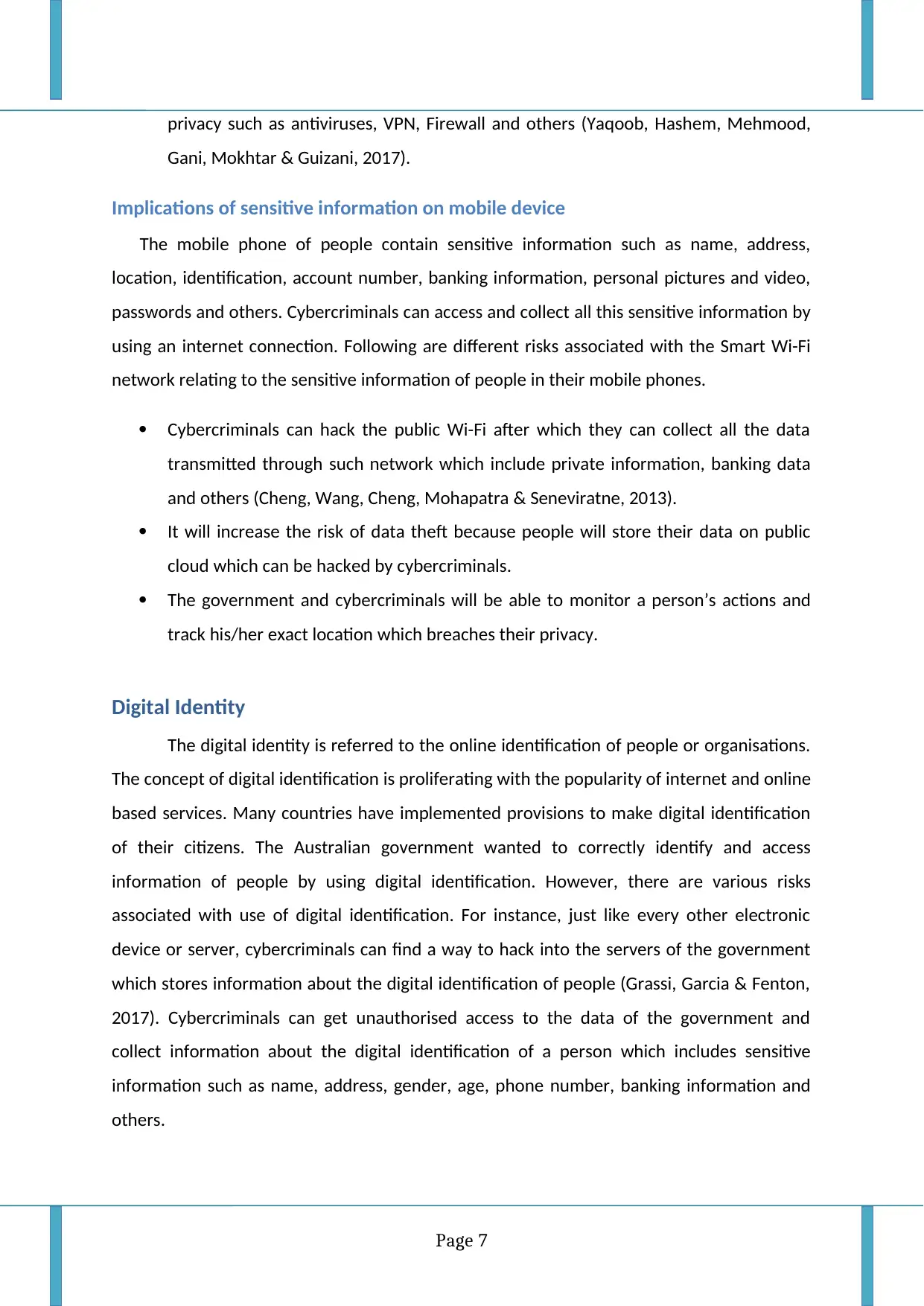
privacy such as antiviruses, VPN, Firewall and others (Yaqoob, Hashem, Mehmood,
Gani, Mokhtar & Guizani, 2017).
Implications of sensitive information on mobile device
The mobile phone of people contain sensitive information such as name, address,
location, identification, account number, banking information, personal pictures and video,
passwords and others. Cybercriminals can access and collect all this sensitive information by
using an internet connection. Following are different risks associated with the Smart Wi-Fi
network relating to the sensitive information of people in their mobile phones.
Cybercriminals can hack the public Wi-Fi after which they can collect all the data
transmitted through such network which include private information, banking data
and others (Cheng, Wang, Cheng, Mohapatra & Seneviratne, 2013).
It will increase the risk of data theft because people will store their data on public
cloud which can be hacked by cybercriminals.
The government and cybercriminals will be able to monitor a person’s actions and
track his/her exact location which breaches their privacy.
Digital Identity
The digital identity is referred to the online identification of people or organisations.
The concept of digital identification is proliferating with the popularity of internet and online
based services. Many countries have implemented provisions to make digital identification
of their citizens. The Australian government wanted to correctly identify and access
information of people by using digital identification. However, there are various risks
associated with use of digital identification. For instance, just like every other electronic
device or server, cybercriminals can find a way to hack into the servers of the government
which stores information about the digital identification of people (Grassi, Garcia & Fenton,
2017). Cybercriminals can get unauthorised access to the data of the government and
collect information about the digital identification of a person which includes sensitive
information such as name, address, gender, age, phone number, banking information and
others.
Page 7
Gani, Mokhtar & Guizani, 2017).
Implications of sensitive information on mobile device
The mobile phone of people contain sensitive information such as name, address,
location, identification, account number, banking information, personal pictures and video,
passwords and others. Cybercriminals can access and collect all this sensitive information by
using an internet connection. Following are different risks associated with the Smart Wi-Fi
network relating to the sensitive information of people in their mobile phones.
Cybercriminals can hack the public Wi-Fi after which they can collect all the data
transmitted through such network which include private information, banking data
and others (Cheng, Wang, Cheng, Mohapatra & Seneviratne, 2013).
It will increase the risk of data theft because people will store their data on public
cloud which can be hacked by cybercriminals.
The government and cybercriminals will be able to monitor a person’s actions and
track his/her exact location which breaches their privacy.
Digital Identity
The digital identity is referred to the online identification of people or organisations.
The concept of digital identification is proliferating with the popularity of internet and online
based services. Many countries have implemented provisions to make digital identification
of their citizens. The Australian government wanted to correctly identify and access
information of people by using digital identification. However, there are various risks
associated with use of digital identification. For instance, just like every other electronic
device or server, cybercriminals can find a way to hack into the servers of the government
which stores information about the digital identification of people (Grassi, Garcia & Fenton,
2017). Cybercriminals can get unauthorised access to the data of the government and
collect information about the digital identification of a person which includes sensitive
information such as name, address, gender, age, phone number, banking information and
others.
Page 7
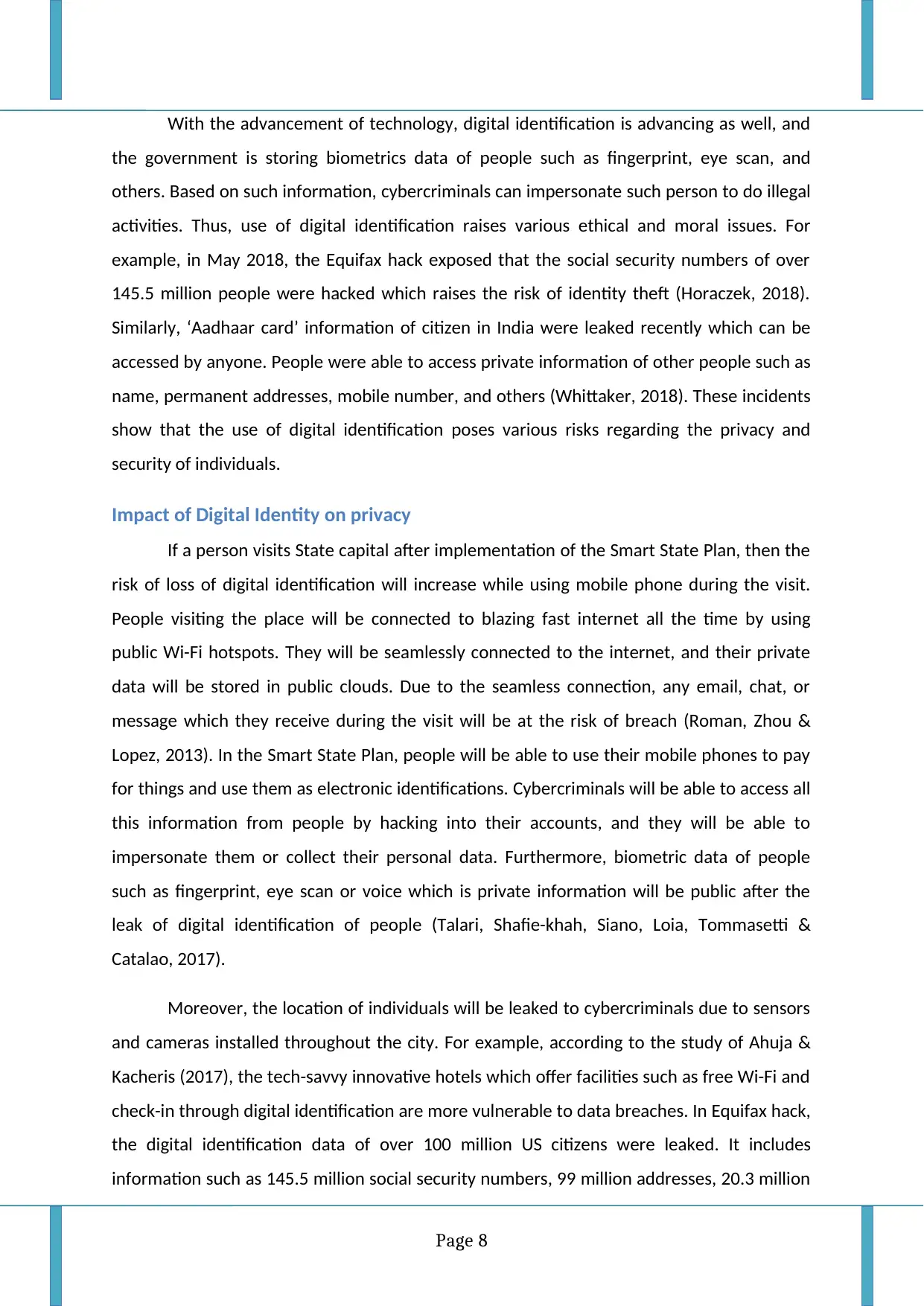
With the advancement of technology, digital identification is advancing as well, and
the government is storing biometrics data of people such as fingerprint, eye scan, and
others. Based on such information, cybercriminals can impersonate such person to do illegal
activities. Thus, use of digital identification raises various ethical and moral issues. For
example, in May 2018, the Equifax hack exposed that the social security numbers of over
145.5 million people were hacked which raises the risk of identity theft (Horaczek, 2018).
Similarly, ‘Aadhaar card’ information of citizen in India were leaked recently which can be
accessed by anyone. People were able to access private information of other people such as
name, permanent addresses, mobile number, and others (Whittaker, 2018). These incidents
show that the use of digital identification poses various risks regarding the privacy and
security of individuals.
Impact of Digital Identity on privacy
If a person visits State capital after implementation of the Smart State Plan, then the
risk of loss of digital identification will increase while using mobile phone during the visit.
People visiting the place will be connected to blazing fast internet all the time by using
public Wi-Fi hotspots. They will be seamlessly connected to the internet, and their private
data will be stored in public clouds. Due to the seamless connection, any email, chat, or
message which they receive during the visit will be at the risk of breach (Roman, Zhou &
Lopez, 2013). In the Smart State Plan, people will be able to use their mobile phones to pay
for things and use them as electronic identifications. Cybercriminals will be able to access all
this information from people by hacking into their accounts, and they will be able to
impersonate them or collect their personal data. Furthermore, biometric data of people
such as fingerprint, eye scan or voice which is private information will be public after the
leak of digital identification of people (Talari, Shafie-khah, Siano, Loia, Tommasetti &
Catalao, 2017).
Moreover, the location of individuals will be leaked to cybercriminals due to sensors
and cameras installed throughout the city. For example, according to the study of Ahuja &
Kacheris (2017), the tech-savvy innovative hotels which offer facilities such as free Wi-Fi and
check-in through digital identification are more vulnerable to data breaches. In Equifax hack,
the digital identification data of over 100 million US citizens were leaked. It includes
information such as 145.5 million social security numbers, 99 million addresses, 20.3 million
Page 8
the government is storing biometrics data of people such as fingerprint, eye scan, and
others. Based on such information, cybercriminals can impersonate such person to do illegal
activities. Thus, use of digital identification raises various ethical and moral issues. For
example, in May 2018, the Equifax hack exposed that the social security numbers of over
145.5 million people were hacked which raises the risk of identity theft (Horaczek, 2018).
Similarly, ‘Aadhaar card’ information of citizen in India were leaked recently which can be
accessed by anyone. People were able to access private information of other people such as
name, permanent addresses, mobile number, and others (Whittaker, 2018). These incidents
show that the use of digital identification poses various risks regarding the privacy and
security of individuals.
Impact of Digital Identity on privacy
If a person visits State capital after implementation of the Smart State Plan, then the
risk of loss of digital identification will increase while using mobile phone during the visit.
People visiting the place will be connected to blazing fast internet all the time by using
public Wi-Fi hotspots. They will be seamlessly connected to the internet, and their private
data will be stored in public clouds. Due to the seamless connection, any email, chat, or
message which they receive during the visit will be at the risk of breach (Roman, Zhou &
Lopez, 2013). In the Smart State Plan, people will be able to use their mobile phones to pay
for things and use them as electronic identifications. Cybercriminals will be able to access all
this information from people by hacking into their accounts, and they will be able to
impersonate them or collect their personal data. Furthermore, biometric data of people
such as fingerprint, eye scan or voice which is private information will be public after the
leak of digital identification of people (Talari, Shafie-khah, Siano, Loia, Tommasetti &
Catalao, 2017).
Moreover, the location of individuals will be leaked to cybercriminals due to sensors
and cameras installed throughout the city. For example, according to the study of Ahuja &
Kacheris (2017), the tech-savvy innovative hotels which offer facilities such as free Wi-Fi and
check-in through digital identification are more vulnerable to data breaches. In Equifax hack,
the digital identification data of over 100 million US citizens were leaked. It includes
information such as 145.5 million social security numbers, 99 million addresses, 20.3 million
Page 8
⊘ This is a preview!⊘
Do you want full access?
Subscribe today to unlock all pages.

Trusted by 1+ million students worldwide
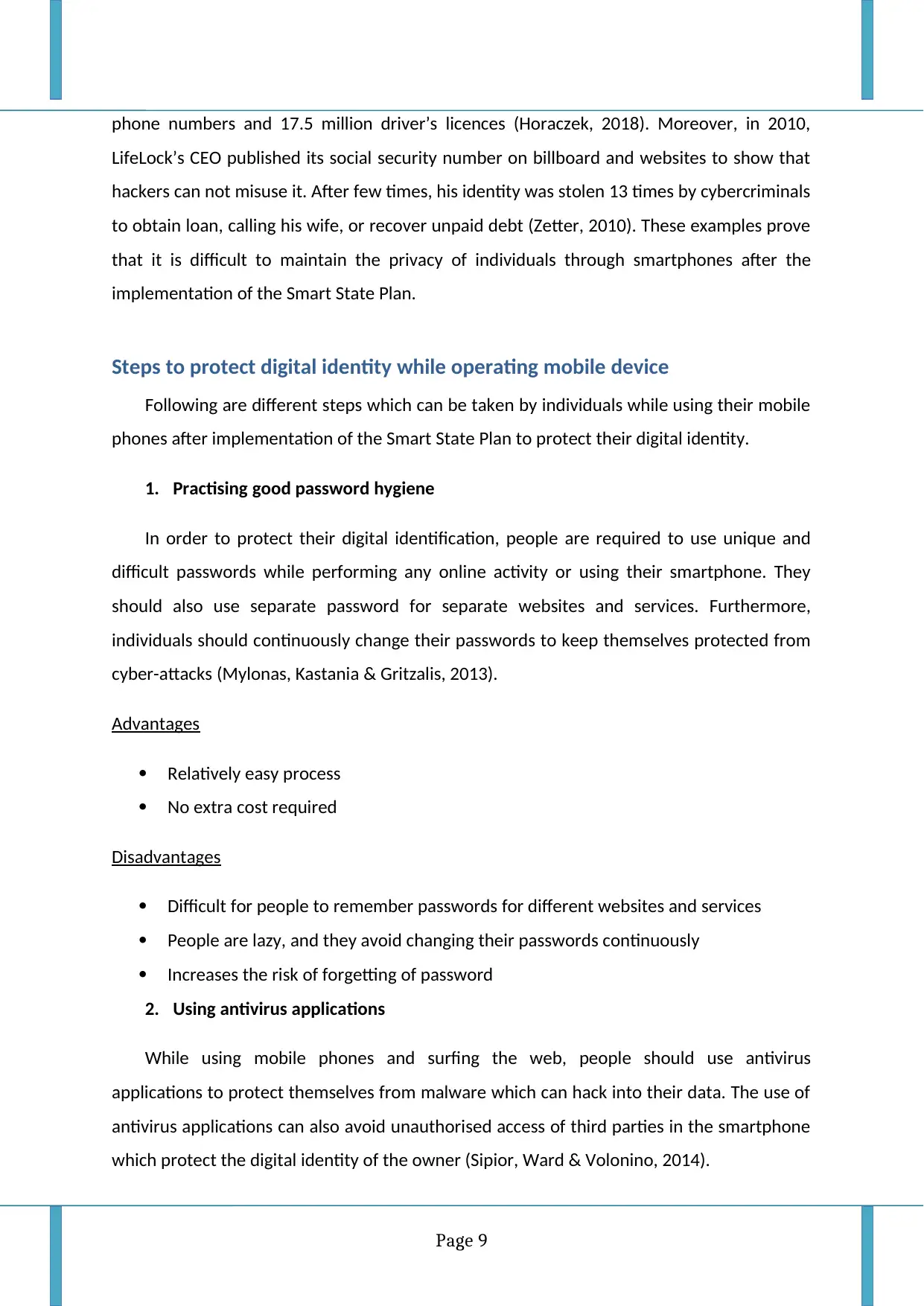
phone numbers and 17.5 million driver’s licences (Horaczek, 2018). Moreover, in 2010,
LifeLock’s CEO published its social security number on billboard and websites to show that
hackers can not misuse it. After few times, his identity was stolen 13 times by cybercriminals
to obtain loan, calling his wife, or recover unpaid debt (Zetter, 2010). These examples prove
that it is difficult to maintain the privacy of individuals through smartphones after the
implementation of the Smart State Plan.
Steps to protect digital identity while operating mobile device
Following are different steps which can be taken by individuals while using their mobile
phones after implementation of the Smart State Plan to protect their digital identity.
1. Practising good password hygiene
In order to protect their digital identification, people are required to use unique and
difficult passwords while performing any online activity or using their smartphone. They
should also use separate password for separate websites and services. Furthermore,
individuals should continuously change their passwords to keep themselves protected from
cyber-attacks (Mylonas, Kastania & Gritzalis, 2013).
Advantages
Relatively easy process
No extra cost required
Disadvantages
Difficult for people to remember passwords for different websites and services
People are lazy, and they avoid changing their passwords continuously
Increases the risk of forgetting of password
2. Using antivirus applications
While using mobile phones and surfing the web, people should use antivirus
applications to protect themselves from malware which can hack into their data. The use of
antivirus applications can also avoid unauthorised access of third parties in the smartphone
which protect the digital identity of the owner (Sipior, Ward & Volonino, 2014).
Page 9
LifeLock’s CEO published its social security number on billboard and websites to show that
hackers can not misuse it. After few times, his identity was stolen 13 times by cybercriminals
to obtain loan, calling his wife, or recover unpaid debt (Zetter, 2010). These examples prove
that it is difficult to maintain the privacy of individuals through smartphones after the
implementation of the Smart State Plan.
Steps to protect digital identity while operating mobile device
Following are different steps which can be taken by individuals while using their mobile
phones after implementation of the Smart State Plan to protect their digital identity.
1. Practising good password hygiene
In order to protect their digital identification, people are required to use unique and
difficult passwords while performing any online activity or using their smartphone. They
should also use separate password for separate websites and services. Furthermore,
individuals should continuously change their passwords to keep themselves protected from
cyber-attacks (Mylonas, Kastania & Gritzalis, 2013).
Advantages
Relatively easy process
No extra cost required
Disadvantages
Difficult for people to remember passwords for different websites and services
People are lazy, and they avoid changing their passwords continuously
Increases the risk of forgetting of password
2. Using antivirus applications
While using mobile phones and surfing the web, people should use antivirus
applications to protect themselves from malware which can hack into their data. The use of
antivirus applications can also avoid unauthorised access of third parties in the smartphone
which protect the digital identity of the owner (Sipior, Ward & Volonino, 2014).
Page 9
Paraphrase This Document
Need a fresh take? Get an instant paraphrase of this document with our AI Paraphraser
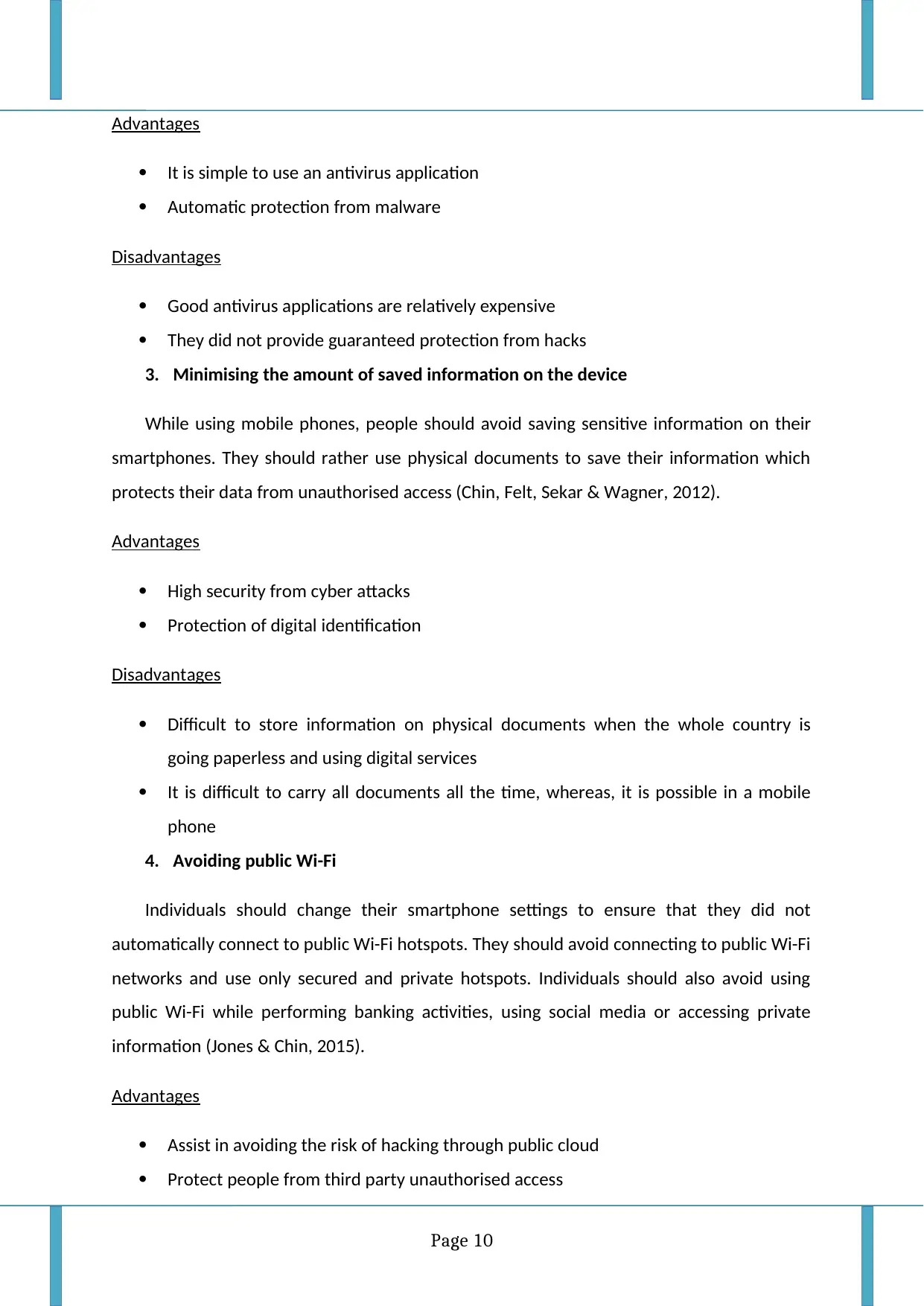
Advantages
It is simple to use an antivirus application
Automatic protection from malware
Disadvantages
Good antivirus applications are relatively expensive
They did not provide guaranteed protection from hacks
3. Minimising the amount of saved information on the device
While using mobile phones, people should avoid saving sensitive information on their
smartphones. They should rather use physical documents to save their information which
protects their data from unauthorised access (Chin, Felt, Sekar & Wagner, 2012).
Advantages
High security from cyber attacks
Protection of digital identification
Disadvantages
Difficult to store information on physical documents when the whole country is
going paperless and using digital services
It is difficult to carry all documents all the time, whereas, it is possible in a mobile
phone
4. Avoiding public Wi-Fi
Individuals should change their smartphone settings to ensure that they did not
automatically connect to public Wi-Fi hotspots. They should avoid connecting to public Wi-Fi
networks and use only secured and private hotspots. Individuals should also avoid using
public Wi-Fi while performing banking activities, using social media or accessing private
information (Jones & Chin, 2015).
Advantages
Assist in avoiding the risk of hacking through public cloud
Protect people from third party unauthorised access
Page 10
It is simple to use an antivirus application
Automatic protection from malware
Disadvantages
Good antivirus applications are relatively expensive
They did not provide guaranteed protection from hacks
3. Minimising the amount of saved information on the device
While using mobile phones, people should avoid saving sensitive information on their
smartphones. They should rather use physical documents to save their information which
protects their data from unauthorised access (Chin, Felt, Sekar & Wagner, 2012).
Advantages
High security from cyber attacks
Protection of digital identification
Disadvantages
Difficult to store information on physical documents when the whole country is
going paperless and using digital services
It is difficult to carry all documents all the time, whereas, it is possible in a mobile
phone
4. Avoiding public Wi-Fi
Individuals should change their smartphone settings to ensure that they did not
automatically connect to public Wi-Fi hotspots. They should avoid connecting to public Wi-Fi
networks and use only secured and private hotspots. Individuals should also avoid using
public Wi-Fi while performing banking activities, using social media or accessing private
information (Jones & Chin, 2015).
Advantages
Assist in avoiding the risk of hacking through public cloud
Protect people from third party unauthorised access
Page 10
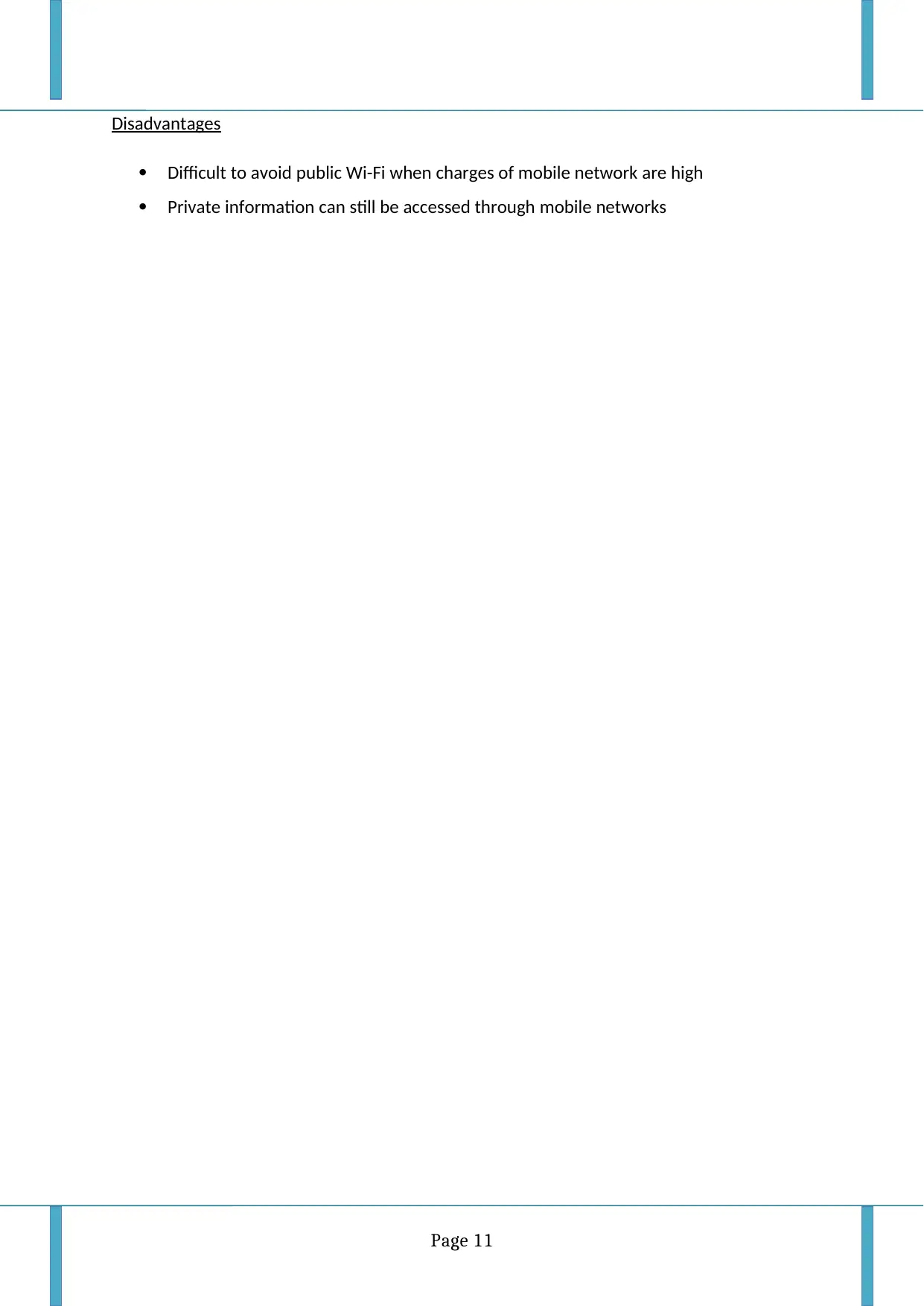
Disadvantages
Difficult to avoid public Wi-Fi when charges of mobile network are high
Private information can still be accessed through mobile networks
Page 11
Difficult to avoid public Wi-Fi when charges of mobile network are high
Private information can still be accessed through mobile networks
Page 11
⊘ This is a preview!⊘
Do you want full access?
Subscribe today to unlock all pages.

Trusted by 1+ million students worldwide
1 out of 16
Related Documents
Your All-in-One AI-Powered Toolkit for Academic Success.
+13062052269
info@desklib.com
Available 24*7 on WhatsApp / Email
![[object Object]](/_next/static/media/star-bottom.7253800d.svg)
Unlock your academic potential
Copyright © 2020–2026 A2Z Services. All Rights Reserved. Developed and managed by ZUCOL.

